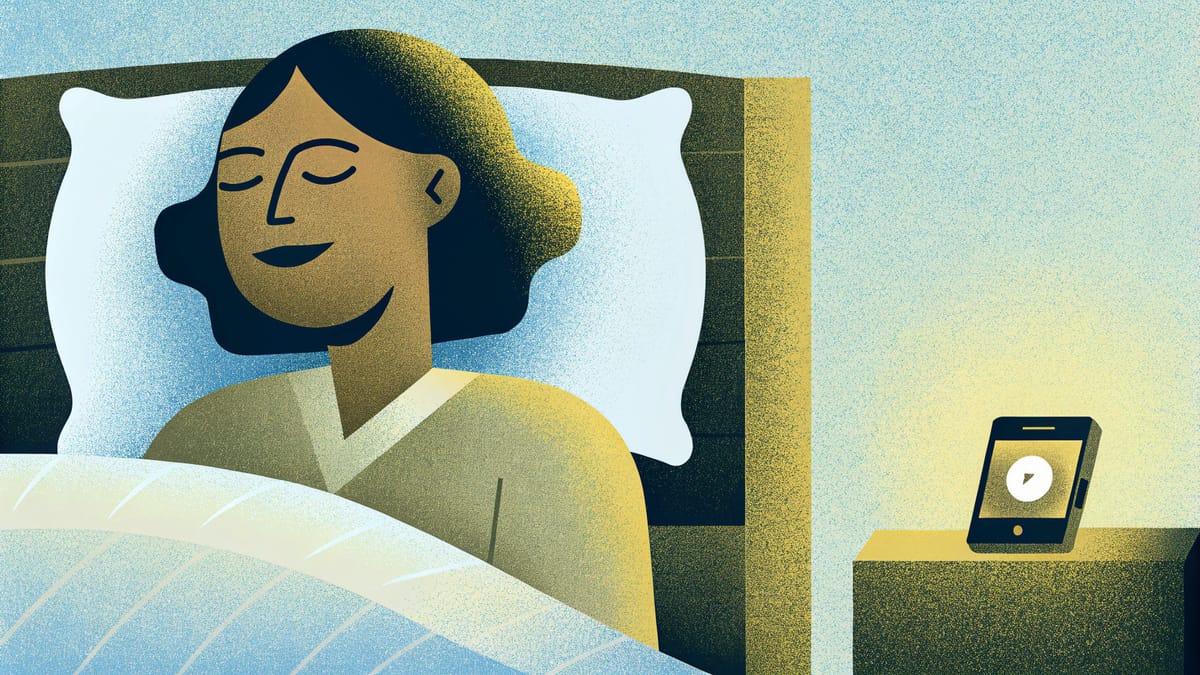How Can Bedtime Stories Improve Sleep Quality for Grown-Ups?
Discover how bedtime stories can enhance sleep quality for adults by promoting relaxation and establishing a calming nighttime routine, featuring insights from Dreamland Tapes.

Did you know that bedtime stories could be the key to improving your sleep quality? While traditionally seen as a ritual for children, bedtime stories are increasingly making their way into the nighttime routines of adults. From reducing stress to creating a sense of calm, there are countless ways this simple practice can transform your sleep.

How Bedtime Stories Lower Stress Levels
Life is full of stress, but listening to a bedtime story can provide a soothing mental escape. When you immerse yourself in a narrative, it redirects your focus away from daily worries. This mental reprieve can reduce anxiety, naturally preparing your mind and body for restful sleep.
Think of it as a way to hit the "pause" button on stress before you drift off. In addition, bedtime stories often engage the imagination with calming themes, unlike the high-energy visuals on social media or TV. This can initiate the relaxation response in your nervous system.
The result? A slower heart rate, reduced cortisol levels, and an easier transition into sleep.
Building A Better Sleep Routine
Consistency is key when it comes to good sleep hygiene, and bedtime stories can help you establish a dependable nighttime ritual. By listening to a story every night at the same time, you signal to your brain that it’s time to wind down. Sleep specialists often emphasize the importance of creating predictable pre-sleep activities, and adding stories fits perfectly into this framework.
Over time, pairing bedtime stories with other calming behaviors—like dim lighting or herbal tea—can further reinforce this healthy habit. Don’t be surprised if your body begins to naturally prepare for sleep as soon as the story begins. It’s the power of routine at work!
Helping You Focus And Relax
If you’ve ever stayed awake while your thoughts raced uncontrollably, you know how frustrating it can be. Bedtime stories provide gentle mental stimulation that nudges your focus away from those endless thoughts. Unlike podcasts or audiobooks with complex ideas, bedtime stories are often intentionally slower and soothing.
By concentrating on the steady rhythm of a story, your brain can transition from an active, problem-solving state to a relaxed, passive state. This mental engagement works particularly well for those who struggle with overthinking before bed.
Imagine the comfort of letting a narrator guide your thoughts while your mind slips peacefully into sleep.
The Perfect Alternative To Screen Time
Scrolling through your phone or watching TV before bed might feel relaxing, but the reality is that screen time can sabotage your sleep. The blue light emitted by screens disrupts your body’s natural production of melatonin, the hormone that helps regulate sleep.
Bedtime stories, however, are a screen-free option that won’t interfere with your circadian rhythm. Listening to a story is also less stimulating compared to the endless flow of entertainment on social media platforms.
Instead of triggering restlessness with digital distractions, bedtime stories create a calm auditory experience, allowing your body to wind down properly.
Tapping Into Nostalgia And Comfort
For many adults, bedtime stories evoke childhood memories of safety and warmth. This nostalgic connection carries powerful emotional benefits that can create a deep sense of reassurance. From classic fairy tales to gentle life lessons, these stories can tap into the soothing feelings of simpler times.
By incorporating bedtime stories into your routine, you’re bringing a touch of that childhood comfort into your adult life. This emotional cocoon of well-being can promote a sense of security ideal for restful sleep.

Boosting Cognitive And Emotional Well-Being
Bedtime stories aren’t just about falling asleep; they can also help improve your mind over time. Regular exposure to stories enhances creativity, empathy, and emotional awareness. These cognitive benefits extend beyond relaxation and play a role in promoting overall mental wellness.
Better mental health often leads to better sleep. By consistently engaging with stories, you may find that your mind becomes better equipped to manage emotions, which contributes to fewer restless nights. It’s a simple way to combine self-care with self-improvement.
Relaxation Through Guided Imagery
Many modern bedtime stories include elements of guided imagery or meditation, leading listeners through tranquil landscapes or peaceful scenarios. For instance, you might imagine walking through a quiet forest or floating on a gentle ocean wave.
These guided visualizations activate your parasympathetic nervous system, encouraging your body to relax physically and mentally. This approach is particularly beneficial for those who struggle to wind down after a busy day.
Instead of feeling restless, you’ll find yourself drawn into the peaceful narrative, easing your transition from wakefulness to sleep.
Key Takeaways
- Listening to bedtime stories reduces stress and anxiety, preparing your mind and body for restful sleep.
- This nightly ritual helps create a consistent sleep routine, improving sleep hygiene and offering a screen-free alternative to wind down.
- Bedtime stories blend emotional comfort, cognitive benefits, and guided relaxation, offering a holistic approach to better sleep.